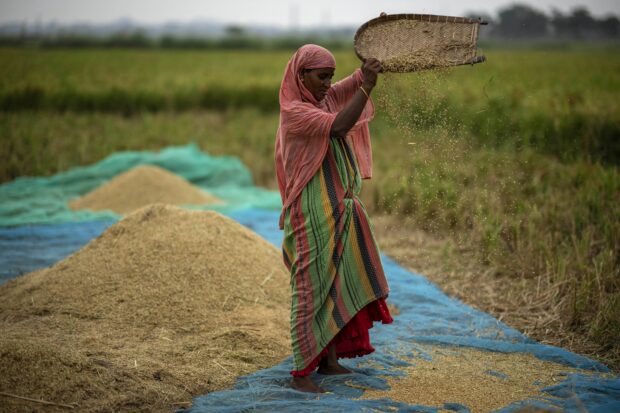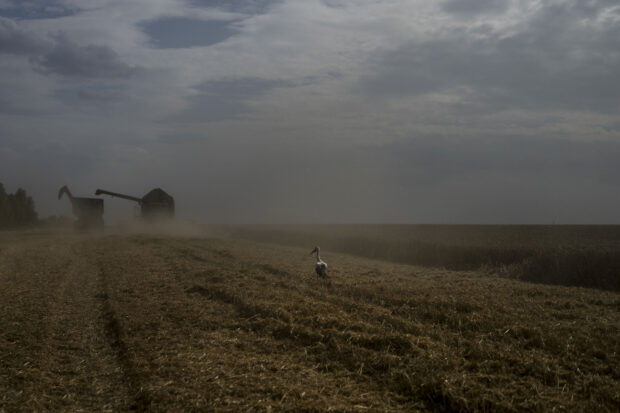Global food prices rise after Russia ends grain deal and India restricts rice exports

FILE – A farmer drops rice crop while working in a paddy field on the outskirts of Guwahati, India, on June 6, 2023. Global prices for food commodities like rice and vegetable oil have risen for the first time in months after Russia pulled out of a wartime agreement allowing Ukraine to ship grain to the world and India restricted some of its rice exports, the U.N. Food and Agriculture Organization said Friday Aug. 4, 2023. (AP Photo/Anupam Nath, File)
LONDON — Global prices for food commodities like rice and vegetable oil have risen for the first time in months after Russia pulled out of a wartime agreement allowing Ukraine to ship grain to the world, and India restricted some of its rice exports, the U.N. Food and Agriculture Organization said Friday.
The FAO Food Price Index, which tracks monthly changes in the international prices of commonly traded food commodities, increased 1.3% in July over June, driven by higher costs for rice and vegetable oil. It was the first uptick since April, when higher sugar prices bumped up the index slightly for the first time in a year.
Commodity prices have been falling since hitting record highs last year in the wake of Russia’s invasion of Ukraine.
Disrupted supplies from the two countries exacerbated a global food crisis because they’re leading suppliers of wheat, barley, sunflower oil and other affordable food products, especially to nations in parts of Africa, the Middle East and Asia where millions are struggling with hunger.
The world is still rebounding from those price shocks, which have increased inflation, poverty and food insecurity in developing nations that rely on imports.
Now, there are new risks after Russia in mid-July exited a deal brokered by the U.N. and Turkey that provided protections for ships carrying Ukraine’s agricultural products through the Black Sea. Along with Russian attacks on Ukrainian ports and grain infrastructure, wheat and corn prices have been zigzagging on global markets.

FILE – A bird stands on a wheat field as a combine harvests the crops in Cherkasy region, Ukraine, on July 25, 2023. Global prices for food commodities like rice and vegetable oil have risen for the first time in months after Russia pulled out of a wartime agreement allowing Ukraine to ship grain to the world and India restricted some of its rice exports, the U.N. Food and Agriculture Organization said Friday Aug. 4, 2023. (AP Photo/Jae C. Hong, File)
International wheat prices rose by 1.6% in July over June, the first increase in nine months, FAO chief economist Maximo Torero said.
More worrying is India’s trade ban on some varieties of non-Basmati white rice, prompting hoarding of the staple in some parts of the world. The restrictions imposed late last month came as an earlier-than-expected El Niño brought drier, warmer weather in some parts of Asia and was expected to harm rice production.
Rice prices rose 2.8% in July from a month earlier and 19.7% this year to reach their highest level since September 2011, the FAO said.
More expensive rice “raises substantial food security concerns for a large swath of the world population, especially those that are most poor and who dedicate a larger share of their incomes to purchase food,” the organization said in a statement.
It will be especially challenging for sub-Saharan Africa because it’s a key importer of rice, Torero told reporters.
Even sharper was the jump in vegetable oil prices as tracked by the FAO, rising 12.1% last month over June after falling for seven months in a row. The organization pointed to a 15% surge in sunflower oil prices following “renewed uncertainties” about supplies following the end of the grain deal.
“While the world has adequate food supplies, challenges to supplies from major producers due to conflict, export restrictions or weather-induced production shortfalls can lead to supply and demand imbalances across regions,” said Torero, the FAO chief economist. That will lead to a “lack of food access because of increasing prices and potential food insecurity.”
He noted that global food commodity prices are different than what people pay at markets and grocery stores. Despite prices plunging on world markets since last year, that relief hasn’t reached households.
Local food prices are still rising in many developing countries because their currencies have weakened against the dollar, which is used to buy grain and vegetable oil.
“That transmission from lower commodity prices to the final consumer prices, which include other components like logistics and other products we produce — bread, for example — is not yet happening in developing countries,” Torero said.
Moving back to higher food commodity prices “could make this lack of transmission take longer than expected,” he said.